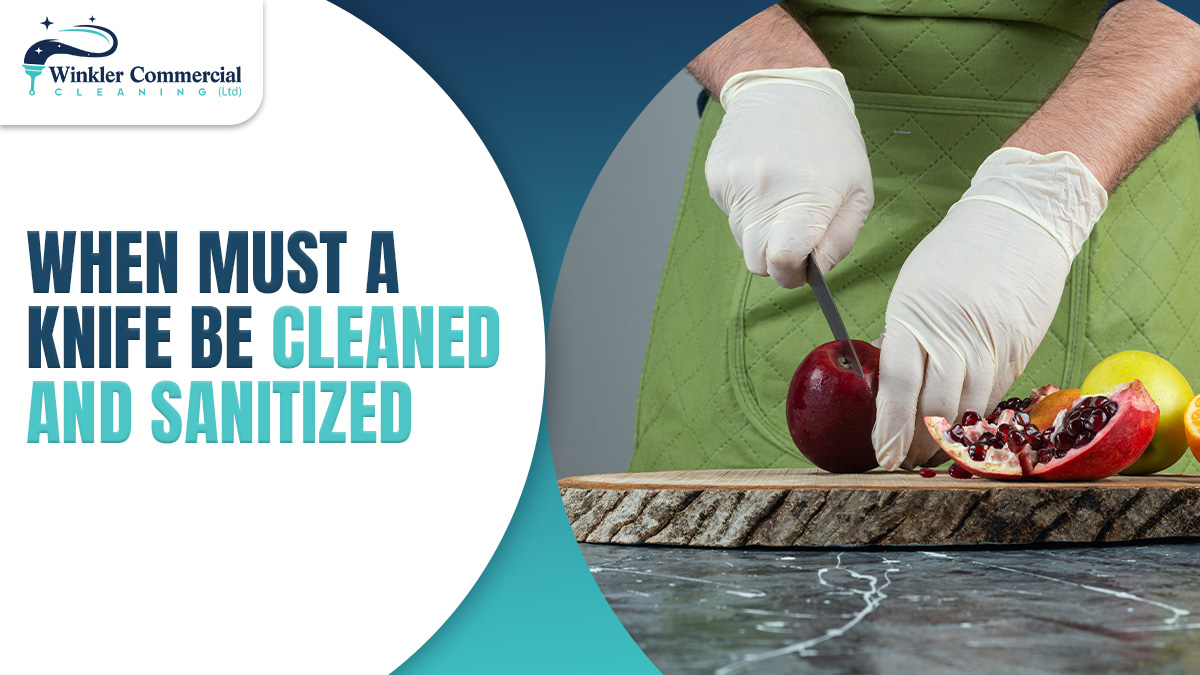In every kitchen, a knife is an important tool for preparing meals. Whether you’re a home cook or a chef, keeping the kitchen clean is very important. One thing many people forget is cleaning and sanitizing their knives. This guide will tell you when and how to clean and sanitize your knives to make sure your kitchen is safe and healthy.
In the world of cooking, where there are many delicious flavors, the cleanliness of your knife is like a hidden tune that’s important and here WinklerCommercialCleaning offers professional and reliable Commercial cleaning services in Winnipeg. This guide is like a map that helps you understand when you should clean and sanitize your knife. Whether you’re just starting to cook at home or you’re a professional chef, knowing how to take care of your knives is important.
Moreover, in this guide, we’ll explain the details of when and how to keep your knives clean. It’s not just about having a clean knife but also about making sure each cut you make is safe and precise, like a beautiful musical performance.
Understanding the Basics
Before we dive into the details, let’s understand why keeping your knife clean is so important. A clean and sanitized knife is not only about avoiding the mixing of germs but also about making your knife last longer. If you take care of your knife regularly, it stays sharp and works well, making your cooking tasks easier.
In the world of cooking, knives are like essential partners, helping us chop and slice with great precision. But there’s more to it than just the art of cutting—there’s a basic responsibility of keeping these kitchen tools clean and safe. The key to having a safe kitchen is knowing the basics of knife hygiene. Regular cleaning isn’t just about making your knife look nice; it’s a practical habit. Cleaning services in Winnipeg involve the professional cleaning of spaces to ensure a tidy and sanitary environment.
A clean knife doesn’t just protect you from potential germs; it also ensures your knife stays in good shape for a long time. This guide sheds light on those important moments when both home cooks and chefs should take a break for a bit of care, making sure their trusty kitchen companion remains a symbol of cleanliness in the kitchen.
When to Clean Your Knife
After Each Use: It’s a common practice, yet often overlooked. Cleaning your knife immediately after each use prevents food particles from drying and sticking to the blade, making the cleaning process much easier.
After Cutting Raw Meat: If you’ve been using your knife to cut raw meat, it’s imperative to clean it thoroughly. Bacteria from raw meat can contaminate other foods, leading to foodborne illnesses. A quick wash with warm, soapy water is usually sufficient.
Switching Ingredients: When transitioning from one ingredient to another, especially from raw meat to vegetables or fruits, take a moment to clean your knife. This simple step helps prevent flavor transfer and cross-contamination.
How to Clean Your Knife
Now that we’ve established when to clean your knife, let’s discuss the proper cleaning process:
Hand Washing: Hand washing is the most effective way to clean your knives. Just use hot water with sponge for cleansing. Avoid abrasive scouring pads, as they can damage the blade. Be thorough but gentle, paying attention to both the blade and the handle.
Avoid Dishwashers: While it might be tempting to toss your knives into the dishwasher for convenience, it’s not recommended. The high-water pressure, harsh detergents, and jostling with other utensils can damage the blade and handle.
When to Sanitize Your Knife
Regularly, Especially in Busy Kitchens: In a busy kitchen, knives can be in constant use. To maintain a hygienic environment, consider sanitizing your knives periodically throughout the day, especially during peak cooking times.
Choosing the Right Knife for Specific Tasks
Now, let’s talk about choosing the right knife for specific tasks, including using
knives for cleaning fish, deer, ducks, and other game.
Fish Cleaning Knife: When it comes to cleaning fish, a specialized knife for fish cleaning is your best bet. Look for one with a sharp, flexible blade for easy maneuvering around bones and scales.
Electric Fish Cleaning Knife: For larger fish or frequent cleaning, an electric fish cleaning knife can be a game-changer. It simplifies the process and ensures precision cuts.
Best Deer Cleaning Knife: Cleaning game like deer requires a sturdy and sharp knife. Invest in a quality deer cleaning knife for a clean and efficient process.
Bird and Duck Cleaning Knife: Cleaning birds, especially ducks, requires a knife with a sharp and narrow blade. Choose a bird cleaning knife or duck cleaning knife specifically designed for this purpose to ensure precision and ease.
Additional Tips and Best Practices
Think about getting a complete knife cleaning kit that comes with tools like a honing rod and sharpening stone. These tools will help keep your knives in the best possible shape. Choose a mild but effective knife cleaner solution for your knives to make sure the blade stays strong.
In addition to regular cleaning, it’s a good idea to sanitize your knives now and then, especially after dealing with raw meat. This extra step adds another layer of protection against possible germs.
To end, Taking care of your knives with the right tools not only makes them last longer but also improves your kitchen experience, ensuring that every cooking adventure is smooth and safe. Home cleaning services focus on keeping residences clean and organized, providing a convenient solution for busy individuals or families.
Knife Cleaning Kit: Consider investing in a knife cleaning kit. These kits often include a honing rod, sharpening stone, and oil to keep your knives in top-notch condition.
Best Knife Cleaning Solution: Look for a mild and effective knife cleaning solution. Avoid harsh chemicals that can compromise the integrity of the blade.
Conclusion
To sum it up, keeping your knives clean is crucial for a healthy kitchen. By following these easy steps and using the right tools, you’ll make sure your knives stay reliable, efficient, and safe to use. Remember, a little care goes a long way in the kitchen, and your knives will appreciate it.
Taking care of your knives is more than just keeping them clean; it’s a commitment to safety and precision in every cooking task. Whether you’re working with delicate fish, game like deer or ducks, or handling various tasks in a busy kitchen, timely cleaning and occasional sanitization are key. Investing in the right tools, whether it’s a special knife for cleaning fish or an electric one for bigger jobs, ensures your kitchen helpers serve you well.
As you make regular cleaning a habit, you’ll not only enjoy a clean blade but also the confidence that your kitchen is a clean and safe place. Let the routine care for your knives become the steady heartbeat of a kitchen where safety, efficiency, and culinary excellence come together.











